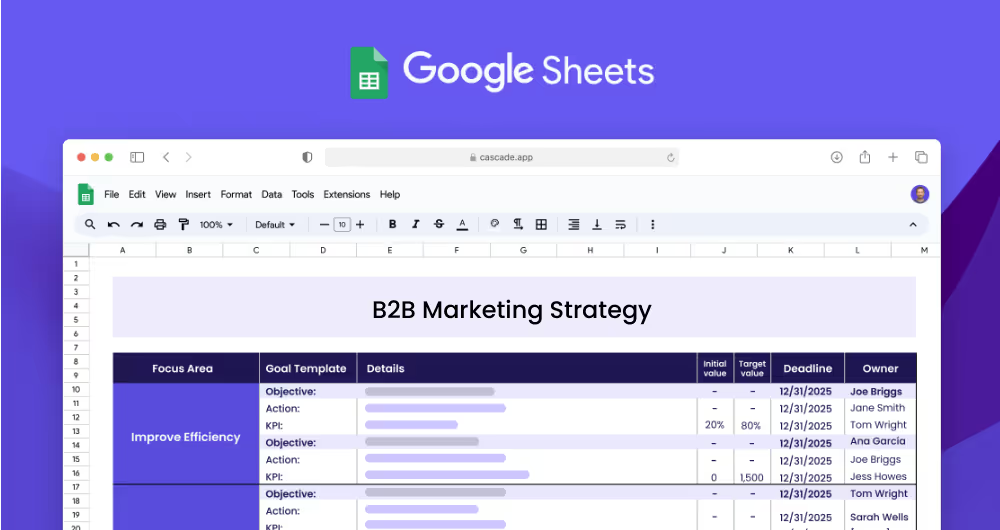A B2B marketing strategy is a comprehensive plan that outlines how a business-to-business organization will achieve its marketing goals. It is designed to help the business achieve its marketing objectives and increase sales. The strategy should include a detailed plan of action, including the specific tactics and activities that will be used to reach the target audience. It should also include the expected results and a timeline for the completion of the activities. In order to be successful, the strategy must be regularly monitored and adjusted to ensure that it is achieving its desired results.
Each focus area has its own objectives, projects, and KPIs to ensure that the strategy is comprehensive and effective.
The B2B Marketing Strategy template is designed to help marketing teams of business-to-business organizations create a plan to manage their marketing. It provides a clear structure for the development and execution of a comprehensive strategy that will guide the team in achieving their desired outcomes. This template can be used by both experienced and novice marketers alike, as it provides a streamlined approach to developing a marketing strategy that is tailored to the needs of the business.
When developing a B2B marketing strategy, it is important to identify clear focus areas. The focus areas should be based on the marketing objectives of the business and should provide a clear direction for the activities that will be undertaken. Examples of focus areas could include increasing sales performance, improving content marketing, and strengthening customer relationships.
Once the focus areas have been identified, it is important to think of objectives that could fall under each focus area. These objectives should be specific, measurable, achievable, and time-bound.
Examples of some objectives for the focus area of Improve Sales Performance could be: Increase Lead Conversion Rate, and Lower Cost-Per-Lead.
Once the objectives have been identified, it is important to set measurable targets (Key Performance Indicators or KPIs) to track the progress of the objectives. These KPIs should be specific and measurable. Examples of KPIs include increasing the lead conversion rate from 10% to 20%, and decreasing the cost-per-lead from $100 to $50.
In order to achieve the KPIs, projects or actions must be implemented. These projects should be designed to help the business achieve their objectives and reach their desired outcomes. Examples of projects that could be undertaken include enhancing the lead nurturing process, creating engaging content, and implementing a customer loyalty program.
If you’re ready to upgrade your strategic processes and see quicker, more efficient outcomes, Cascade Strategy Execution Software is your next step forward. Cascade transcends traditional spreadsheet limitations by offering a centralized, dynamic platform, enhancing real-time insights and streamlined collaboration. Transition from static plans to dynamic strategy execution with tools that integrate planning closely with real-world execution. Sign-up for free or book a demo with one of our strategy experts and begin optimizing your strategic execution today!


